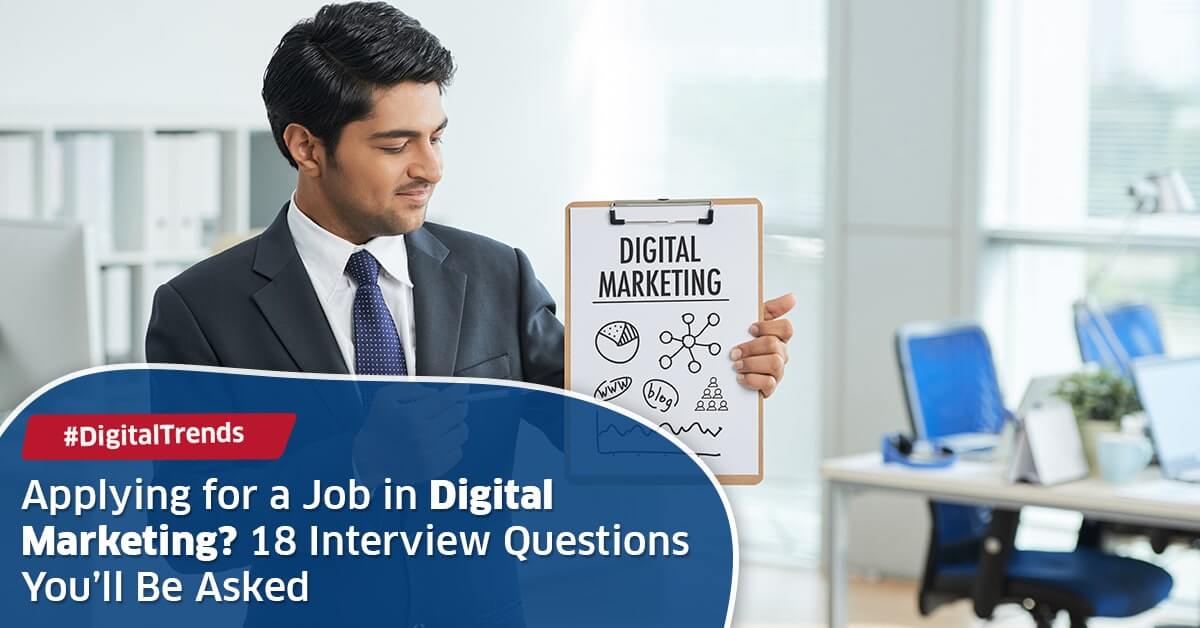The global market for digital ads and marketing will cross the $1.5 trillion mark by 2030.
The industry remains a hotbed of opportunities, offering high-paying, fulfilling, and never-boring jobs.
So, it makes sense you want to build a career in digital marketing.
Now, cracking job interviews for digital marketing roles is challenging. Especially if you’re applying for generic positions like ‘digital marketing specialists’ where you’re required to have a broader knowledge of different sub-topics of digital marketing, like SEO (search engine optimization), PPC (pay-per-click), content marketing, social media ads, and more.
To help you prepare for a digital marketing interview, here are some of the most frequently asked questions interviewers ask candidates:
(Note: The answers below are kept to the point. When you’re facing a question in the interview, add your own understanding, depth, and personality to the answers. You want to read the room and personalize your responses accordingly. You’ll get extra points if you add anecdotes to your answers. Interviewers love it!)
What are the key components of digital marketing?
The key components of digital marketing include search engine optimization, content marketing, social media marketing, pay-per-click advertising, email marketing, mobile marketing, and analytics.
Each component serves a specific purpose in attracting, engaging, and converting online audiences.
What’s the difference between SEO and SEM?
SEO focuses on optimizing a website to rank higher in organic search results, enhancing visibility without direct payment.
On the other hand, SEM (Search Engine Marketing) involves organic and paid tactics like PPC to gain visibility on search engines.
Both are crucial: SEO for long-term organic growth and SEM for immediate visibility and targeted reach.
What are some ways to make social media marketing more effective?
Effective social media marketing strategies include understanding the target audience, creating engaging and platform-specific content, using both organic and paid advertising methods, engaging actively with the audience, and analyzing performance metrics for continual improvement.
What is audience targeting?
Audience targeting in digital marketing involves identifying and segmenting potential customers based on demographics, interests, behavior, and other criteria.
This allows marketers to create tailored content and campaigns that resonate with specific groups, leading to higher engagement and conversion rates.
What are the key performance indicators to evaluate a PPC campaign?
KPIs for a PPC campaign include click-through rate (CTR), conversion rate, cost per click (CPC), cost per acquisition (CPA), and return on ad spend (ROAS). These metrics help assess the effectiveness of the ads in terms of audience engagement, cost efficiency, and overall ROI.
What are some important elements of an effective email marketing campaign?
An effective email marketing campaign requires a targeted and segmented email list, personalized content, a clear and compelling subject line, a responsive design, strong calls-to-action (CTAs), and compliance with email regulations like GDPR.
Regular A/B testing and performance analytics are also crucial for optimization.
Why is mobile optimization important in digital marketing?
Mobile optimization is important because of the increasing use of smartphones for internet access.
It ensures that content and ads are effectively displayed on mobile devices, improving user experience, engagement, and conversion rates.
Mobile optimization also impacts SEO, as search engines favor mobile-friendly websites.
How do you conduct a competitive analysis?
Conducting a competitive analysis involves identifying competitors, analyzing their digital marketing strategies, and assessing their strengths and weaknesses.
This includes reviewing their website, SEO tactics, content strategy, social media presence, and advertising campaigns.
You can use tools like Semrush and Ahrefs for competitive analysis.
Benefits include gaining insights into market trends, identifying gaps in your own strategy, and discovering new opportunities for differentiation.
What are the best practices for keyword research in SEO?
Best practices for keyword research include identifying terms relevant to your business and audience, analyzing search volume and competition for these terms, considering long-tail keywords for more targeted traffic, and understanding user intent.
Using tools like Google Keyword Planner and regularly updating and refining your keyword list based on search trends and analytics are also essential.
What is conversion rate optimization?
Conversion rate optimization (CRO) is the process of enhancing your website and its content to increase the percentage of visitors who complete a desired action, like making a purchase or signing up for a newsletter.
CRO is critical because it directly impacts a business’s ability to convert online traffic into tangible results, thereby improving ROI from existing traffic.
What strategies can enhance a website’s conversion rate?
Strategies to enhance a website’s conversion rate include creating a clear and intuitive user interface, ensuring fast load times, using compelling and relevant CTAs, offering live chat support, implementing A/B testing to refine elements like page layout and content, and personalizing user experiences based on visitor data and behavior.
How can data analytics optimize digital marketing campaigns?
Data analytics can optimize digital marketing campaigns by providing insights into audience behavior, campaign performance, and customer preferences.
This data allows marketers to tailor content, target specific audience segments more effectively, adjust strategies in real-time, and allocate resources to the most effective channels and tactics.
What are some important current trends in digital marketing?
The most impactful trends in digital marketing include the increasing use of AI and machine learning for personalized marketing, the rise of voice search optimization, the growing importance of video content, the emphasis on user experience and interactive content, and the integration of omnichannel marketing strategies for a cohesive user experience across various platforms.
How do you handle negative feedback or a PR crisis on social media?
Handling negative feedback or a PR crisis involves prompt response, transparency, and taking responsibility where necessary.
It’s important to actively listen to the concerns, communicate openly with the audience, and offer solutions or corrective actions.
Monitoring social media channels constantly and having a crisis management plan in place are also key to effectively managing such situations.
How do you define influencer marketing?
Influencer marketing involves partnering with individuals with a significant social media following to promote products or services.
The main challenges include choosing the right influencers whose audience aligns with the brand, measuring ROI, and navigating the changing algorithms of social media platforms.
Opportunities include reaching a larger and more engaged audience, building brand trust, and generating authentic content.
What is the relationship between UX design and digital marketing effectiveness?
The relationship between UX design and digital marketing effectiveness is integral.
Good UX design enhances user engagement, satisfaction, and conversion rates, directly impacting the success of digital marketing efforts.
It ensures the marketing content is accessible and enjoyable to the user, leading to better campaign performance and customer retention.
How would you assess the success of a content marketing strategy?
The effectiveness of a content marketing strategy is assessed by metrics such as website traffic, engagement rates, time spent on a page, conversion rates, and social shares.
It also involves evaluating how well the content aligns with audience needs and interests and contributes to achieving overall marketing goals.
How would you adjust a failing digital marketing campaign?
To adjust a failing digital marketing campaign, it’s crucial to analyze performance data to identify areas of weakness.
This may involve refining the target audience, adjusting the content or messaging, experimenting with different channels or formats, or revising the overall strategy.
Continuous testing, monitoring, and flexibility in strategy implementation are key to turning around a failing campaign.
Final thoughts
While this collection covers common questions in digital marketing interviews, it’s important to remember that specific questions may vary depending on the role’s requirements.
For instance, a position focused on performance marketing might lean more toward questions about paid campaigns rather than organic strategies.
However, these questions give you a solid foundation and reflect what is typically asked in the industry.
The exact phrasing may differ, but with a strong fundamental understanding of digital marketing concepts, you’ll be well-prepared to handle any variation of these questions and confidently demonstrate your expertise in the field.





